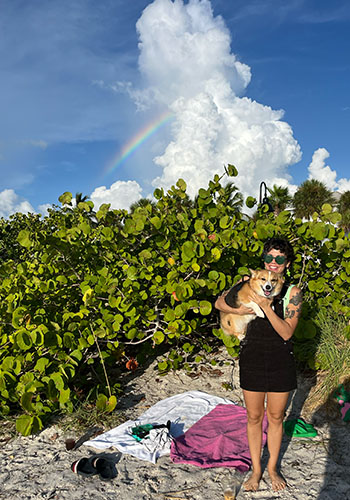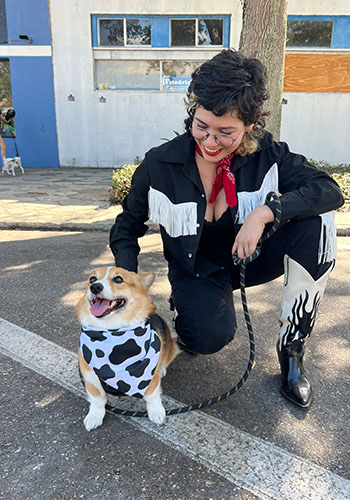Drea Cornejo lives in St. Petersburg, FL, with her partner and their 2 pups—a sassy corgi named Slug and a spirited supermutt named Bambi. Diagnosed with metastatic lung cancer in 2022 at age 26, she’s been navigating life with a terminal illness while still embracing joy, curiosity, and community. As a video journalist, she often focuses on stories about the young adult cancer community, bringing visibility to underrepresented voices and lived experiences. When she’s not reporting, you can usually find her tending to her plants, soaking up the sun, or savoring a strong coffee (or 3).
When, at only 26 years old, Drea noticed her ankle swelling for no obvious reason, she never imagined the long road ahead. An initial diagnosis of deep vein thrombosis (DVT) led to a cascade of mysterious and worsening symptoms, including bruising, difficulty breathing, unexplained weight loss, and a strange rattling noise coming from her throat. Five months after that first symptom, Drea was diagnosed with stage 4 (IV) lung cancer.
After her diagnosis and still very sick, Drea was discharged from the hospital and told that someone would “look into” clinical trials for her. “Looking back, I was so sick no clinical trial would have accepted me,” she says. “I had pulmonary embolisms, sepsis, and fluid in my heart—I was on my way out.”
When a home nurse urged her to return to the hospital, Drea reluctantly agreed. At that point, she could barely walk across the room without gasping for air. It turned out to be a life-saving decision. Scans revealed the cancer was spreading rapidly. She needed an emergency blood transfusion stat to start a platinum-based chemotherapy.
Hope in a ROS1 diagnosis
In the initial chaos there was a turning point: biomarker testing. The results revealed a rare ROS1 mutation that made her eligible for a targeted therapy (TKI) called Rozlytrek (entrectinib). Her doctors were enthusiastic. “I remember thinking, I’m celebrating having a mutation? This is weird.”
Her new treatment worked quickly, and Drea’s scans began to stabilize. At that point, she was able to transfer to a comprehensive cancer center where a multidisciplinary care team began to address not just her cancer but her long list of other complications, including early congestive heart failure.
Drea was able to stay on Rozlytrek (entrectinib) for 3 years before switching to a new treatment earlier this year after experiencing oligoprogression (when someone with metastatic cancer experiences progression in a few spots while the rest of the cancer stays the same with treatment). This TKI, Lorbrena (lorlatinib), is technically approved for ALK-positive cancers but has also turned out to be a powerful brain-penetrating drug for ROS1+ cancers.
Despite feeling grateful to have the option of a new treatment, the transition between drugs was tough for Drea. “I was bedridden for two weeks,” she says. “The withdrawal symptoms were awful — full body pains, this weird pressure behind my eyes, it hurt to breathe, it hurt to swallow.’
Now, she says, “I’m slowly feeling more like myself,” a feeling aided by the fact that the new TKI is working. Her first MRI following the treatment change showed a near complete response.
The power of community
 Drea is quick to praise biomarker testing and personalized treatment for her survival, but she also credits something else: her community. Specifically, The ROS1ders, a group of patients with the same rare mutation who share advice, support, and hope. “That group saved my life. I’ve learned so much from them, but more than anything else, they gave me hope,” she said. “Seeing other ROS1ders living long and healthy lives changed my perspective about my own survival.”
Drea is quick to praise biomarker testing and personalized treatment for her survival, but she also credits something else: her community. Specifically, The ROS1ders, a group of patients with the same rare mutation who share advice, support, and hope. “That group saved my life. I’ve learned so much from them, but more than anything else, they gave me hope,” she said. “Seeing other ROS1ders living long and healthy lives changed my perspective about my own survival.”
That connection was vital after a traumatic early experience with a doctor who told her she likely had a 3-month expiration date. “I believed him,” she says, “and that did so much damage to me. It wasn’t until I met other patients living for years with this disease that something flipped in me.”
Drea muses about sending that doctor a photo from her recent 3-year cancerversary celebration, where she posed with a cake that said, “Good job not dying.” “I just want to tell him, ‘Surprise! I’m still alive,’” she says.
A new voice for her generation
As Drea got stronger, she started to think of ways that she could make something meaningful out of her diagnosis. She made the powerful decision to pair her career as a journalist with The Washington Post with her personal experiences with lung cancer in order to tell stories and raise awareness about what living with cancer is really like, especially for young people. Her work has explored the rising rates of cancer in young adults and has helped shine a spotlight on the realities of survivorship for her generation.
Earlier this year, she was honored to share the story of a young couple navigating a pregnancy while living with a terminal cancer diagnosis. Drea describes working with Shay and Tanner Martin as “powerful but also very, very emotionally draining for me.” She also acknowledges her unique ability to help tell their story, given her own diagnosis.
More recently, she also published another story in the Generation C series. The video-first piece follows three young adults in their 20s and 30s as they navigate cancer, sharing candid and often humorous reflections on identity, relationships, body image, and the emotional and financial realities of treatment.
Drea also told her own story in a comic published by The Post earlier this year. In it, she described how she had to push for her diagnosis due to dismissive doctors.
She shared her story not only to process what she’s been through, but to help others understand that lung cancer can happen to anyone with lungs. “I used to be very shy and reserved, but if being loud and open about my diagnosis gets people talking, then so be it.”
She’s become a vocal advocate for the unique needs of young cancer patients, needs that often go unrecognized by a system still largely designed for older adults. “There’s not great survivorship support for people in their 20s or 30s,” she says. “We’re still thinking about fertility, dating, our careers. It’s just very different.”
Advice for others
When asked what advice she’d give to others—especially young people—diagnosed with lung cancer, Drea doesn’t hesitate to say: “Be persistent. Be your own best advocate.”
She’s transferred care 3 times to find the right team. She’s leaned on her ROS1ders community to learn what questions to ask and when to push for more and now boasts a health care team that makes her feel seen, heard, and cared for. “At the end of the day,” she says, “health is wealth, and this is your life. What could be more important?”
Finding the right treatment can make all the difference. If you or a loved one has been diagnosed with lung cancer, our LungMATCH program can help you understand biomarker testing, explore treatment options, and connect with clinical trials. Take the next step toward personalized care today.





Leave A Comment